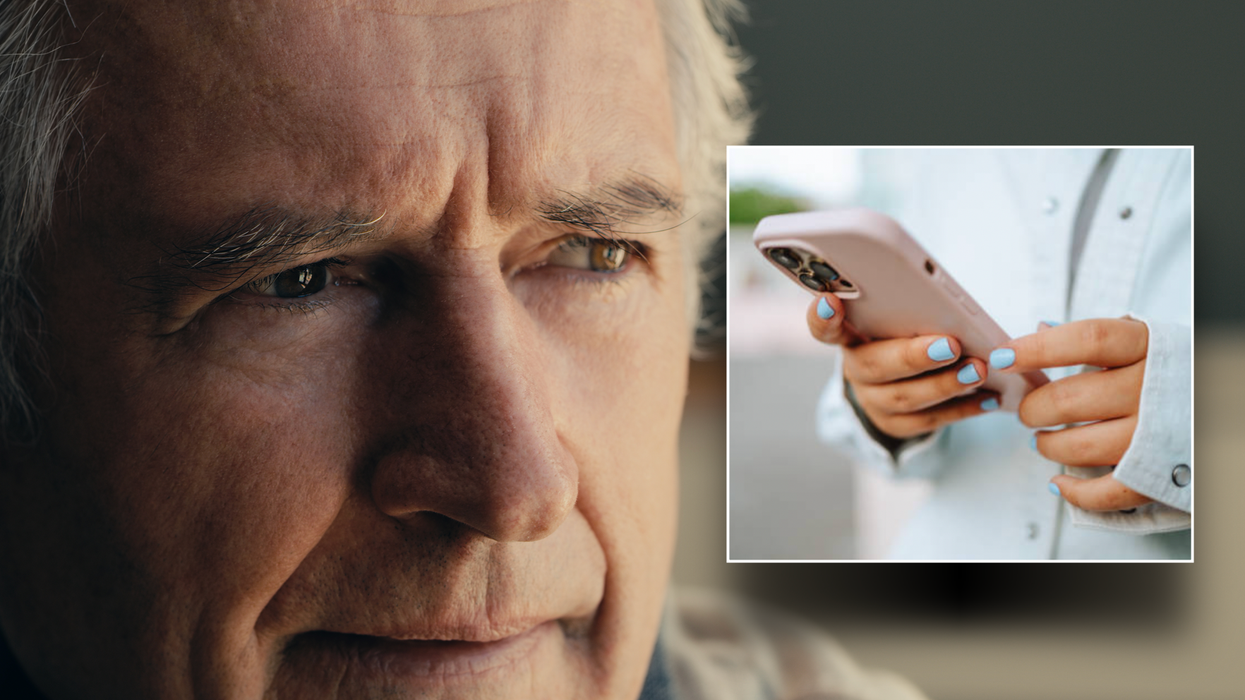Is Google increasing your risk of dementia? Urgent health warning as rates in England soar to record high

Smartphones usage could be dumbing you down and increasing your risk of dementia, warns academic
|Getty Images

Smartphones are no match for the human mind - and could be having a devastating impact, warns top academic
Don't Miss
Most Read
Latest
Thanks to the speed and efficiency of the internet, centuries of knowledge can now be summoned with a simple click of a button - but how the brain acquires information is just as important, and you could be increasing your risk of dementia by taking shortcuts, a leading academic has warned.
In his new book, iMind: Artificial and Real Intelligence, Professor Mohamed I. Elmasry says the focus has shifted too far away from RI (natural, or real) intelligence in favour of AI (machine, or artificial) intelligence.
Prof Elmasry, an expert in microchip design and AI, argues that current or even planned AI cannot match the capabilities of the human brain-mind for speed, accuracy, storage capacity and other functions.
People have come to rely on AI smartphone apps instead of using their real intelligence, and this has come at a devastating cost, the prof claims, adding: “A healthy memory goes hand-in-hand with real intelligence. Our memory simply can’t reach its full potential without RI.”

People have come to rely on AI smartphone apps instead of using their real intelligence
|Getty Images
Not so smart after all
Growing evidence suggests smartphone usage may do more harm than good.
One report found just five minutes of mobile phone time may cause "significant memory impairment".
Researchers tested healthy participants as well as those with Mild Cognitive Impairment (MCI) - a risk factor for dementia - and reported decreased memory abilities before and after phone use.
It was concluded that mobile phones have a “significant negative impact on working memory performance of human participants”.
The report read: “These results are in agreement with previous studies on animals as well as humans on the effects of MP (mobile phone) use on the brain."
Another study, published in the International Journal of Science and Research Archive, concluded that prolonged smartphone usage affects cognitive function in children under 15 - an alarming finding given young people are glued to their phones.
The National Library of Medicine reported on a systematic review, which explored the use of smartphones and tablets as cognitive and memory aids for seniors. The focus was on people both with and without cognitive impairment.
Though there was “some evidence” that smartphones and tablets could aid cognitive function in those without cognitive impairment, there was very little proof in the way of it helping those already suffering with dementia.
Step away from the screen
Prof Elmasry says simple daily habits such as afternoon naps, memory "workouts" and not reaching for a smartphone can increase the odds of healthy ageing.
Research supports his recommendations.
A study published in the journal Sleep Health analysed data from people aged 40 to 69 and found a causal link between habitual napping and larger total brain volume - a marker of good brain health linked to a lower risk of dementia and other diseases.
Likewise, a study published in Neurology in 2021 found that high levels of cognitive activity, such as reading, playing games like checkers and puzzles, and writing letters, can delay the onset of Alzheimer’s disease by five years among those aged 80 years and over.
Prof Elmasry suggests other ways to ‘associative’ memory – the brain’s ‘dictionary of meaning’ - include reading a book aloud, using all of your senses instead of going on autopilot and turning daily encounters into fully-lived experiences.
Other techniques include integrating a day for true rest into the week, reviewing your lifestyle as early as your 20s or 30s, adopting a healthy diet, and eliminating or radically moderating alcohol consumption to reduce the risk of dementia.
The warning about smartphone usage comes as the number of people in England being diagnosed with dementia is at a record high, according to new figures from the NHS.
The latest data shows a record 487,432 people had a diagnosis in June.
While diagnosis rates are at their highest since the start of the pandemic at 65 percent, the health service said it still has more to do to meet its ambition of diagnosing 66.7 percent of the total number of people estimates suggest are living with a form of the disease.
England has one of the highest dementia diagnosis rates in the world, with high-income countries typically in the range of 20 percent to 50 percent, according to the NHS.
Its staff across the country are assessing care home residents to support identification of people who may have dementia to boost numbers further for patients and their families.
A timely diagnosis is vital to ensure more people get the support and care they need to live with the illness.
Thousands more individuals are being diagnosed each month and more medication reviews are being done within 12 months.
The NHS is calling on people to come forward and get checked if they have any common early signs or symptoms.
Doctor Jeremy Isaacs, national clinical director for dementia, NHS England, said: “Getting a diagnosis of dementia is the first step in supporting people, with a wide range of NHS services able to help.
“NHS staff have worked hard to recover services with the number of people with a diagnosis rising significantly over the last year, and now at a record level, but there is more work to be done.
“Thousands more individuals are being diagnosed each month and more medication reviews are being done within 12 months.
“Common early symptoms of dementia include forgetting bits of information, saying the same thing repeatedly, struggling to follow a conversation or find the right word, and being confused about time and place. Usually these problems will be more obvious to the person’s family and friends than to the individual themselves.
“If you have noticed that someone has symptoms, please encourage them to visit their GP for an assessment – the sooner someone is seen the quicker the NHS can help.”










